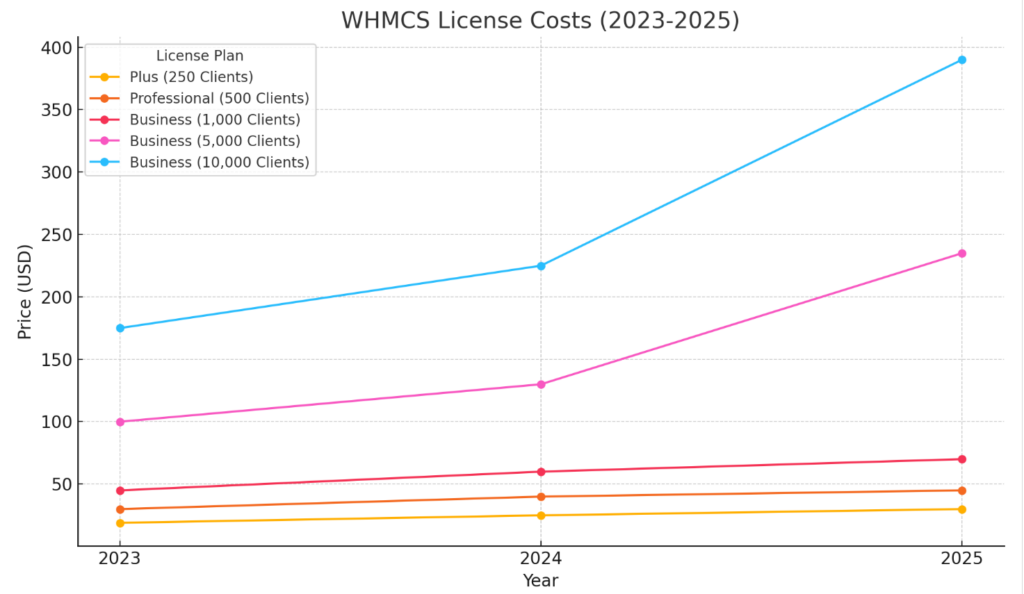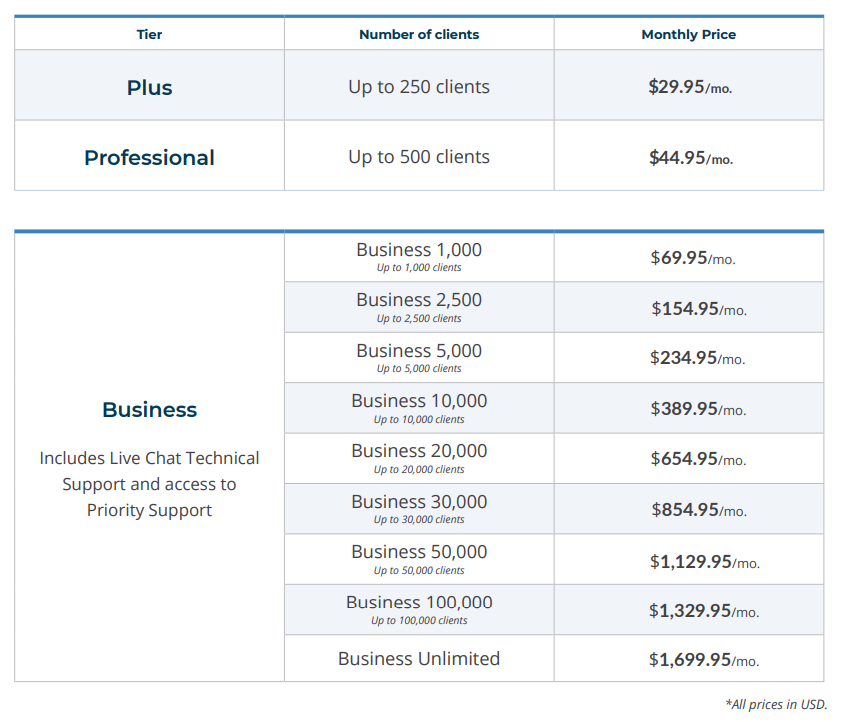In my latest article, I discussed the issue of price increases for cPanel and Plesk software, both used for managing hosting services. I mentioned that WebPros, the owner of these brands and the WHMCS billing system, would soon announce new pricing for 2025. It didn’t take long – today, we are comparing WHMCS price hikes over the past two years.

The following chart and table illustrate the increase in package prices, particularly those aimed at small and medium hosting companies, on a monthly basis. As shown, the largest price hikes affect the Business packages, which have risen by 135% (for the package up to 5000 clients) and 123% (for the package up to 10000 clients) over the past two years. The Plus and Professional packages have increased by 50%.
| License Plan | 2023 Price | 2024 Price | 2025 Price | 2-Year Price Inflation (%) |
| Plus (up to 250 Clients) | $18.95 | $24.95 | $29.95 | 58% |
| Professional (up to 500 Clients) | $29.95 | $39.95 | $44.95 | 50% |
| Business (up to 1,000 Clients) | $44.95 | $59.95 | $69.95 | 36% |
| Business (up to 5,000 Clients) | $99.95 | $129.95 | $234.95 | 135% |
| Business (up to 10,000 Clients) | $174.95 | $224.95 | $389.95 | 123% |
Users are dissatisfied
Posts on the WHMCS community forum reveal that users are not happy with the price increases. However, the situation on the forum is not as dramatic as the outbursts of anger seen in discussions about other WebPros products. While some WHMCS users could accept the price hikes, the main issue is the lack of development in directions expected by the community. They feel their opinions are being ignored, and suggestions for improvements and extensions to the billing platform are dismissed by the owner.
One user, Evolve Hosting WWW, sarcastically remarked that the only recent “innovation” in WHMCS that was useful to him was the requirement to upgrade to a higher PHP version. He also pointed out issues with the heavily promoted PayPal module, problems with the ticketing system, poor quality of MarketConnect extensions, and a lack of trust in hCaptcha.

Indeed, reviewing the release history and forum posts, it seems that WHMCS development has slowed down. The platform appears to rely primarily on the reputation it built over the years as a stable and affordable billing software for hosting services.

What to do, how to move forward?
The classic question that arises with the annual price hikes is: do we have an alternative? It turns out that the answer is not so straightforward. The forum does mention examples of various software – both free, open-source, and commercial – free from the ubiquitous integration of WebPros products with SocialBee. Unfortunately, in most cases, attempts to migrate to solutions like Blesta, FOSSBilling, or SaaS services end in failure, with users returning to WHMCS.
Some users point out that competing software either lacks sufficient technical support, doesn’t have the necessary integrations, or the cost of developing these integrations is too high to absorb all at once. Migrations also pose a challenge, though HostBill offers a migrator tool, and its plans are available through one-time licenses. However, not every small hosting company can afford such a one-off expense.
As for developing your own billing software, which only the largest players can boast of, the costs of design, development, and maintenance do not always turn out to be cheaper in the long run. Sure, you have your own software that you can customize as needed, but if things go wrong, there’s no one to blame or turn to for help.
So what’s next?
Analyzing the situation, it is clear that WHMCS users find themselves in a difficult position. On one hand, they are forced to accept annual price hikes, which in some cases have reached staggering levels. On the other hand, the lack of real alternatives and the high costs of migration make many users choose to stick with the software despite their frustration over the lack of expected innovations.

The rising prices and stagnation in platform development, with its owners seemingly ignoring the needs of the community, could lead to a greater loss of customers in the long term if a suitable alternative emerges, as demonstrated by users’ experiments in attempting to move away from WHMCS. However, for small and medium hosting companies, finding an alternative that meets both their technical and financial requirements remains a challenge. As the market evolves, it will be important to watch closely whether new solutions appear that can provide real competition to WHMCS, or whether users will have to accept further price increases without significant improvements in the software’s functionality.
PS. Below we link to the 2024 and 2025 price list.
Kamil Kołosowski
Author of this post.
